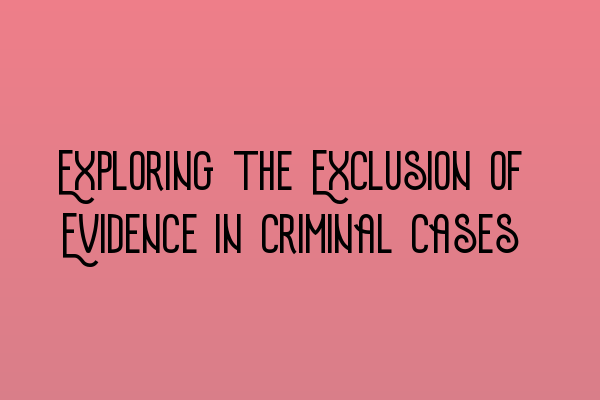Exploring the Exclusion of Evidence in Criminal Cases
In criminal cases, the exclusion of evidence plays a crucial role in ensuring a fair and just legal system. The admissibility of evidence is governed by various rules and principles that aim to maintain the integrity of the criminal justice system. In this article, we will explore the concept of excluding evidence and its implications on criminal cases.
The Importance of Excluding Inadmissible Evidence
Excluding inadmissible evidence is essential for upholding the principles of fairness, justice, and the right to a fair trial. It ensures that only reliable and relevant evidence is presented before the court, preventing prejudice, manipulation, and the wrongful conviction of innocent individuals.
There are several grounds on which evidence can be excluded in criminal cases. These include:
- Breach of the right to privacy: Evidence obtained through unlawful surveillance, unauthorized searches, or invasions of privacy may be excluded from the court proceedings. The right to privacy is a fundamental right protected by law, and any evidence obtained in violation of this right is deemed inadmissible.
- Improper police conduct: Evidence obtained through coercion, duress, or other improper police conduct may be excluded. This includes situations where the police have failed to inform the suspect of their rights or have engaged in misconduct during the investigation.
- Unreliable or tainted evidence: Evidence that is unreliable, tampered with, or obtained through questionable means may be excluded. This ensures that only trustworthy evidence is considered by the court and prevents the use of fabricated or manipulated evidence.
- Violation of legal procedures: Evidence obtained in violation of legal procedures, such as improper handling, storage, or documentation, may be excluded. This ensures that the chain of custody is maintained, and the integrity of the evidence is preserved.
By excluding evidence that falls under these grounds, the courts uphold the rights of the accused and maintain the integrity of the criminal justice system.
The Role of the Legal Representation
Legal representation plays a critical role in identifying and challenging the admissibility of evidence. Criminal defense lawyers are responsible for examining the evidence presented by the prosecution and identifying any grounds for exclusion.
Working closely with their clients, defense attorneys thoroughly analyze the evidence and investigate its origin, collection, and handling. They assess whether the evidence was obtained lawfully and challenge any violations of legal procedures or breaches of rights.
Legal representation for Delaware LLCs in the UK is vital for ensuring that the exclusion of evidence is properly argued in court and that the defendant’s rights are protected throughout the legal process.
Strategies for Overcoming Hurdles
The exclusion of evidence can significantly impact a criminal case, potentially leading to its dismissal or acquittal. Therefore, the prosecution often seeks to overcome any hurdles and have the evidence admitted.
Prosecutors may argue that the evidence was obtained lawfully and in compliance with legal procedures. They may present counterarguments against the claims of improper police conduct, violation of privacy rights, or reliability issues.
Nonetheless, defense attorneys have the opportunity to challenge these arguments and assert their reasons for excluding the evidence. They may present expert testimony, challenge the authenticity of evidence, or dispute its relevance to the case.
Cross-examination is a powerful tool used by defense attorneys to challenge the admissibility of evidence. By skillfully questioning prosecution witnesses, the defense can highlight any discrepancies, inconsistencies, or violations that could render the evidence inadmissible.
Strategies for overcoming hurdles in criminal cases involving the exclusion of evidence are crucial for ensuring a fair trial and protecting the rights of the accused.
Conclusion
The exclusion of evidence in criminal cases is a fundamental aspect of the legal system. It serves to safeguard the rights of the accused, maintain the integrity of the criminal justice process, and ensure a fair trial.
Understanding the grounds for excluding evidence and the role of legal representation is essential for both defendants and legal professionals. By availing the services of experienced defense attorneys and utilizing effective strategies, individuals can maximize their chances of having inadmissible evidence excluded from their criminal cases.
For further insights into criminal law and related topics, feel free to explore our other articles:
- Ensuring Ethical Business Practices: Delaware’s Code of Conduct
- UK Criminal Law: An In-Depth Analysis of the British Legal System
- Legal Challenges for UK Businesses in the U.S.: Strategies for Overcoming Hurdles
